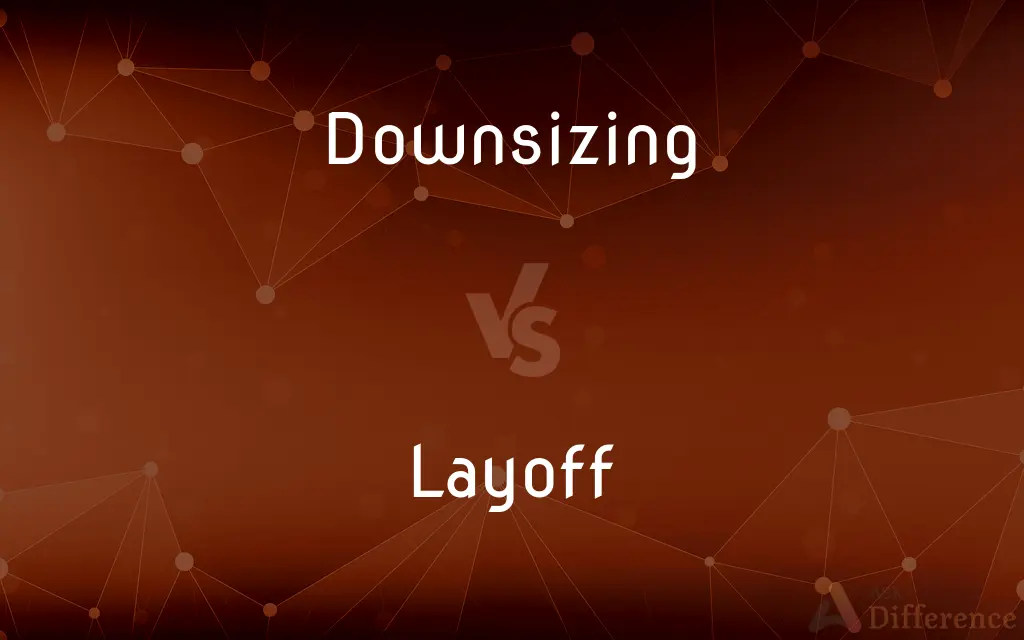Downsizing vs. Layoff — What's the Difference?
By Maham Liaqat & Fiza Rafique — Updated on April 1, 2024
Downsizing is a strategic reduction in a company's size, affecting jobs and operations, while layoffs are temporary or permanent job terminations due to economic downturns.

Difference Between Downsizing and Layoff
Table of Contents
ADVERTISEMENT
Key Differences
Downsizing refers to a company's strategic decision to reduce its workforce and possibly restructure its operations to increase efficiency and reduce costs. This process can involve eliminating positions, closing departments, or even selling off parts of the business. Whereas layoffs are a form of job termination where employees are let go due to economic downturns, lack of work, or financial struggles of the company. Layoffs can be temporary, with the possibility of rehiring when conditions improve, or permanent.
Downsizing is often a proactive measure taken by a company to streamline operations, adapt to market changes, or improve profitability. It can affect all levels of the organization and might be implemented over a period of time. On the other hand, layoffs are typically reactive, prompted by immediate financial pressures or downturns in the economy or industry, affecting mainly the workforce rather than the overall structure of the company.
While downsizing might involve significant changes to a company's business model, operations, and strategy, layoffs are focused more narrowly on reducing personnel costs. Downsizing can lead to a leaner, more focused organization, whereas layoffs, especially if they are large or frequent, can negatively impact morale and productivity among remaining employees.
Downsizing can offer long-term benefits to a company by making it more competitive and financially stable. However, it often requires upfront investment and can lead to short-term disruptions. Layoffs, while less costly upfront, can lead to loss of talent, decreased employee loyalty, and a damaged reputation, potentially harming the company's long-term prospects.
Both downsizing and layoffs are strategies used by companies facing economic challenges, their implications and objectives differ significantly. Downsizing is aimed at repositioning and restructuring the company for future success, while layoffs are a more immediate response to financial pressures, with a primary focus on cost-cutting.
ADVERTISEMENT
Comparison Chart
Definition
Strategic reduction in company size and operations
Temporary or permanent job terminations due to economic downturns
Focus
Company restructuring for efficiency and cost reduction
Reduction of personnel costs
Implementation
Long-term, strategic
Short-term, often reactive
Impact
Can affect all levels of the organization
Primarily affects workforce
Potential for Rehire
Not typically a consideration
May include the possibility of rehire
Compare with Definitions
Downsizing
To realign the company’s structure with its strategic goals.
The downsizing initiative was part of a larger effort to pivot towards emerging markets.
Layoff
Frequently viewed negatively by both employees and the public.
News of the layoffs led to a decline in the company’s reputation among consumers.
Downsizing
A strategic reduction in a company’s workforce and operations to enhance efficiency.
The tech firm announced a downsizing plan to streamline its operations and focus on core products.
Layoff
Often a reactive measure to immediate financial pressures.
In response to the sudden drop in sales, the company announced a series of layoffs.
Downsizing
Can lead to a leaner organization with a more focused business model.
After downsizing, the firm emerged leaner and more focused on high-growth areas.
Layoff
Can lead to loss of talent and lower morale among remaining employees.
The wave of layoffs left the remaining staff feeling insecure and demoralized.
Downsizing
Often seen as a proactive approach to managing economic challenges.
The company viewed downsizing as a necessary step to maintain its competitive edge.
Layoff
A temporary or permanent termination of employment due to economic downturns.
The recession forced the company to initiate layoffs to reduce operational costs.
Downsizing
Part of a broader strategy to reduce costs and improve competitiveness.
By downsizing, the company aims to become more agile in the face of market changes.
Layoff
To quickly reduce personnel costs in response to decreased revenue.
Layoffs were seen as an immediate measure to stabilize the company’s finances.
Downsizing
To reduce in number or size
A corporation that downsized its personnel in response to a poor economy.
Layoff
A layoff or downsizing is the temporary suspension or permanent termination of employment of an employee or, more commonly, a group of employees (collective layoff) for business reasons, such as personnel management or downsizing (reducing the size of) an organization. Originally, layoff referred exclusively to a temporary interruption in work, or employment but this has evolved to a permanent elimination of a position in both British and US English, requiring the addition of "temporary" to specify the original meaning of the word.
Downsizing
To dismiss or lay off from work
Workers who were downsized during the recession.
Layoff
The act of suspending or dismissing an employee, as for lack of work or because of corporate reorganization.
Downsizing
To make in a smaller size
Cars that were downsized during an era of high gasoline prices.
Layoff
A period of temporary inactivity or rest.
Downsizing
To simplify (one's life, for instance), as by reducing the number of one's possessions.
Layoff
A dismissal of employees from their jobs because of tightened budgetary constraints or work shortage (not due to poor performance or misconduct).
Downsizing
To become smaller in size by reductions in personnel or assets
Corporations continued to downsize after the economy recovered.
Layoff
A period of time when someone is unavailable for work.
Downsizing
To live in a simpler way, especially by moving into a smaller residence.
Layoff
A short pass that has been rolled in front of another player for them to kick.
Downsizing
Present participle of downsize
Layoff
A bet that is laid off, i.e. placed with another bookmaker in order to reduce risk.
Downsizing
An act in which a company downsizes or is downsized
He lost his job in the last downsizing.
Layoff
The act of laying off an employee or a work force
Downsizing
Miniaturization
Downsizing
(automotive) Reducing engine's capacity at same power or increasing engine's power without increasing capacity
Downsizing is one of the leading trends in automotive engine design.
Downsizing
The reduction of expeditures and personnel in order to become financial stable; - of businesses.
Downsizing
The reduction of expenditures in order to become financial stable
Common Curiosities
Is downsizing a cost-saving measure?
Yes, downsizing is intended to reduce operational costs and make the company more competitive.
What triggers a company to downsize?
Companies downsize to increase efficiency, adapt to market changes, or improve profitability.
Are layoffs always permanent?
Layoffs can be either temporary, with employees possibly being rehired later, or permanent.
Can layoffs affect a company’s reputation?
Yes, frequent or large-scale layoffs can harm a company’s reputation and employee morale.
Can employees be rehired after a layoff?
In the case of temporary layoffs, companies may rehire employees when conditions improve.
What is the difference between downsizing and restructuring?
Downsizing specifically refers to reducing workforce and operations, while restructuring can involve broader changes including downsizing, reorganizing departments, and altering business strategies.
How does downsizing affect company operations?
Downsizing can lead to a leaner organization, possibly with a more focused business model.
Can a company downsize without laying off employees?
Yes, downsizing can also involve selling off parts of the business or reducing operations without necessarily laying off employees.
Do layoffs always lead to financial stability for a company?
While layoffs can provide short-term financial relief, they may harm long-term prospects by reducing talent and morale.
Is downsizing more strategic than layoffs?
Yes, downsizing is typically part of a broader strategic plan to reshape the company, while layoffs are more of a reactive measure.
How should companies manage the downsizing or layoff process?
Companies should communicate transparently, provide support to affected employees, and consider the long-term impact on remaining staff and the company’s reputation.
How do employees typically react to downsizing?
Downsizing can lead to anxiety and low morale among remaining employees due to the uncertainty and increased workloads.
How do downsizing and layoffs differ in their strategic goals?
Downsizing aims at long-term restructuring for efficiency, while layoffs are a short-term response to reduce costs.
Are layoffs a sign of a failing company?
Not necessarily; layoffs can be a strategic move to navigate financial challenges or economic downturns.
What long-term effects can layoffs have on a company?
Layoffs can lead to a loss of experienced employees, decreased loyalty, and a damaged reputation.
Share Your Discovery

Previous Comparison
Occupied vs. Preoccupied
Next Comparison
Peace vs. SolaceAuthor Spotlight
Written by
Maham LiaqatCo-written by
Fiza RafiqueFiza Rafique is a skilled content writer at AskDifference.com, where she meticulously refines and enhances written pieces. Drawing from her vast editorial expertise, Fiza ensures clarity, accuracy, and precision in every article. Passionate about language, she continually seeks to elevate the quality of content for readers worldwide.
















































